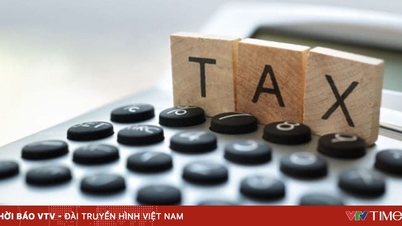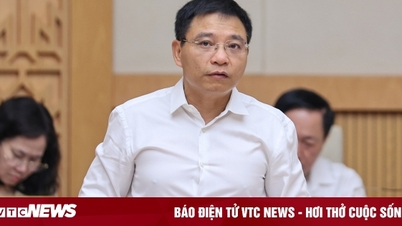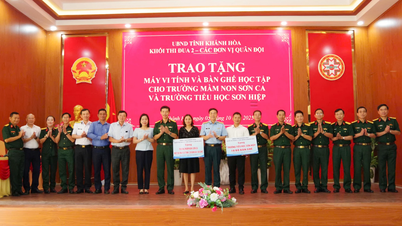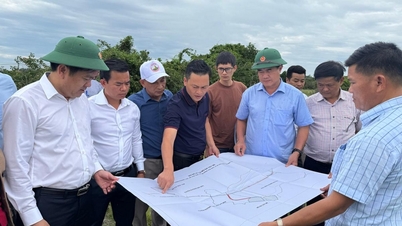In recent times, information on monthly and annual state budget revenues has always been a positive sign for the economy . Experts have assessed that the forecasting of state budget revenues has harmoniously combined traditional and modern methods, with process modifications, thereby achieving higher accuracy.
| Modernization to "nurture" sustainable tax revenue Tax industry: Shifting management mindset to service and support |
Forecast close to reality
Mr. Mai Xuan Thanh, Director General of the General Department of Taxation, said that revenue forecasting is not only an important tool in managing the State budget, but also a core factor in improving the quality of State budget management. Accurate revenue forecasting helps the Government to develop appropriate financial plans, thereby allocating resources reasonably for all activities of the country, avoiding budget deficits or wasting resources. On the contrary, inaccurate forecasts can lead to budget imbalances, affecting the implementation of socio-economic development tasks and long-term national goals. In addition, State budget revenue forecasting is also used in the policy-making process, including assessing the impact before, during and after the issuance of policies. At the same time, revenue forecasting tools are also used as a measure to help assess the quality of revenue management and identify tax gaps for a number of taxes.
To improve the accuracy of State budget revenue forecasting, there needs to be close coordination between agencies and units in providing information on macroeconomics and financial and monetary policies and other information and data. Accordingly, the Ministry of Finance has coordinated with relevant agencies and units to establish a Working Group on macroeconomic forecasting and revenue forecasting, including 25 members from 11 agencies and units under the Ministry of Planning and Investment. The Working Group is responsible for organizing and implementing State budget revenue forecasting, including providing and building necessary databases, coordinating with experts to research, develop and operate macroeconomic forecasting and revenue forecasting models. The goal is to make realistic forecasts and at the same time develop guidance documents from database building to building, operating and applying revenue forecasting models, Mr. Mai Xuan Thanh informed.
However, the gap between the budget and actual revenue collection for some revenue items is still quite large, especially for those that are strongly affected by unusual factors. Ms. Pham Thi Tuyet Lan, Director of the Tax Revenue Estimate Department (General Department of Taxation) shared that since the outbreak of the Covid-19 pandemic, especially in 2021 and 2022, the economy has fluctuated greatly, many uncertain factors are beyond the forecast of domestic and international organizations, inflation has broken out globally, investment capital flows have shifted strongly between countries, completely changing the economic growth rate compared to the target when building the budget.
 |
| Modernizing revenue forecasting to promote efficiency in state budget management |
In addition, it is very difficult to accurately forecast revenue from crude oil because prices not only depend on supply and demand in the market, but are also greatly influenced by the world political situation, especially in countries with large oil reserves. Another example is the average growth rate of land use fee revenue over periods and years is uneven, with some areas having irregular, unstable and unpredictable developments, concentrated in localities with advantages in industrial development, logistics, economy, tourism... In addition, the land use fee revenue estimate is built from the base with the participation of many levels and sectors but is not yet tight and timely... which has affected the quality of forecasting land-related revenues, Ms. Pham Thi Tuyet Lan said.
Simplify processes, increase technology application
To improve the quality of forecasting and budgeting closer to actual occurrences, the General Department of Taxation believes that it is necessary to promote revenue decentralization associated with revenue management decentralization, eliminating the interlocking. Strengthening the responsibility and authority of authorities at all levels, institutionalizing the responsibility in providing information, coordinating forecasting and budgeting between agencies, departments, branches and revenue agencies need to be specified and individualized closer to reality.
In addition, it is necessary to simplify the process of forecasting and estimating budget revenue based on the construction and completion of application software to automate data collection, and apply software to integrate information outside the tax sector to serve the analysis, forecasting, and estimating work. Promoting the application of information technology in collecting and processing information, restructuring the time for each stage appropriately, ensuring that 20% of the time is spent on collecting and processing information, and 80% of the time is spent on analysis, evaluation, and forecasting is extremely necessary.
To improve forecasting accuracy, experts recommend adopting advanced forecasting models such as regression, cross-sector balance sheets, and big data analytics to process increasingly complex information volumes. Experience from Germany and other European countries shows that using these tools can significantly improve forecast accuracy, reducing errors to less than 5%. The government should also consider simplifying the budgeting process by reducing the number of levels involved and applying digital technology.
At the same time, it is necessary to prioritize the construction of a national data warehouse on budget revenue, integrating from the central to local levels to help standardize information and improve forecasting efficiency. This is an important step to ensure transparency and the ability to respond quickly to economic fluctuations. Above all, it is necessary to develop human resources through in-depth training for officials working on revenue forecasting, which is a key factor. Vietnam should organize cooperative courses with international experts and build long-term training programs, including sending officials abroad to learn practical experience.
Whatever the solution, according to Ms. Pham Thi Tuyet Lan, the construction of the State budget estimate must cover revenue sources, ensure positivity, and be close to actual occurrence; must correctly and fully calculate each revenue item, tax, and revenue field for each locality according to the law on tax, tax management, and State budget management.
Source: https://thoibaonganhang.vn/hien-dai-hoa-cong-tac-du-bao-thu-ngan-sach-159128.html


![[Photo] Prime Minister Pham Minh Chinh chairs the Government's online conference with localities](https://vphoto.vietnam.vn/thumb/1200x675/vietnam/resource/IMAGE/2025/10/5/264793cfb4404c63a701d235ff43e1bd)

![[Photo] Prime Minister Pham Minh Chinh launched a peak emulation campaign to achieve achievements in celebration of the 14th National Party Congress](https://vphoto.vietnam.vn/thumb/1200x675/vietnam/resource/IMAGE/2025/10/5/8869ec5cdbc740f58fbf2ae73f065076)


























































![[VIDEO] Summary of Petrovietnam's 50th Anniversary Ceremony](https://vphoto.vietnam.vn/thumb/402x226/vietnam/resource/IMAGE/2025/10/4/abe133bdb8114793a16d4fe3e5bd0f12)

![[VIDEO] GENERAL SECRETARY TO LAM AWARDS PETROVIETNAM 8 GOLDEN WORDS: "PIONEER - EXCELLENT - SUSTAINABLE - GLOBAL"](https://vphoto.vietnam.vn/thumb/402x226/vietnam/resource/IMAGE/2025/7/23/c2fdb48863e846cfa9fb8e6ea9cf44e7)




































Comment (0)